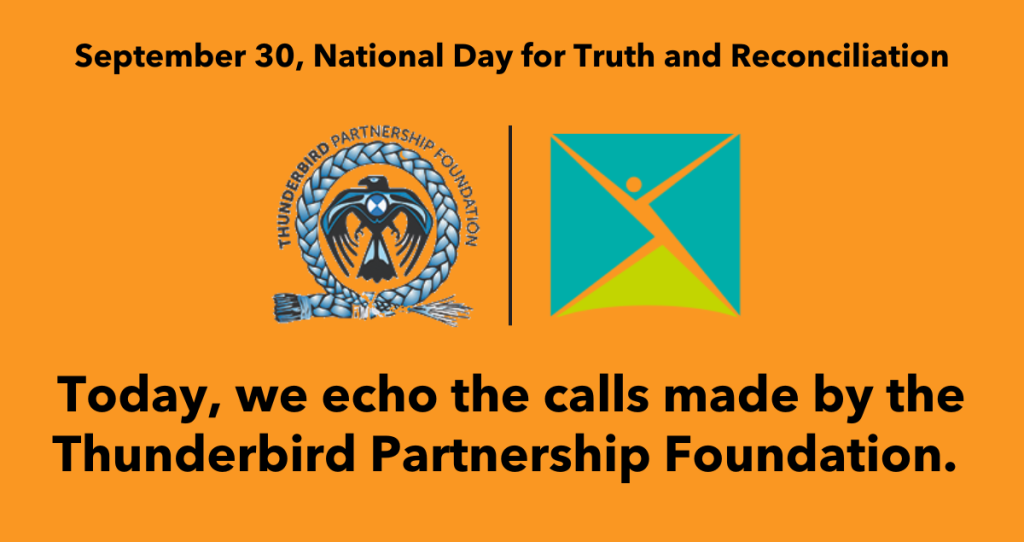Menu
Close

Open letter to the federal government: National Day for Truth and Reconciliation
Sep 30, 2022
The Canadian Mental Health Association (CMHA) stands firm in supporting the self-determination of Indigenous people and the implementation of the Truth and Reconciliation Commission of Canada’s Calls to Action. On this National Day for Truth and Reconciliation, we use our platform to echo calls from the Thunderbird Partnership Foundation and their partners for increased federal government investments in First Nations, Métis and Inuit-led mental health and substance use health programs and services to ensure that they are sustainable, equitable, culturally specific, land-based and trauma-informed.[1]
As a community-based organization providing mental health and substance use health support in more than 330 communities across the country, CMHA is keenly aware of the wage disparities, underfunding, and undervaluing of services delivered by organizations outside of hospital settings. This inequity is more pronounced in programs delivered by Indigenous community-based organizations for Indigenous people. We are also deeply concerned about the lack of access to services that are culturally safe and relevant for Indigenous people. Colonization and ongoing systemic discrimination contribute to the intergenerational trauma, racism, and structural inequities experienced by First Nations, Inuit, and Métis people. CMHA is committed to the dismantling of racist and colonial practices that are embedded in the mental health system, and in our own history[2] and we believe that the federal government’s failure to provide funding to redress these harms signals a lack of commitment to reconciliation.
In the first year of the pandemic, the number of opioid-poisoning related deaths among First Nations people was significantly higher than among non-First Nations people.[3] It is important to recognize that funding for First Nations addictions treatment programs has fallen short for decades. First Nations addiction workers are paid nearly 45% less than their provincial counterparts.[4] While substance use rates are increasing, staff turnover rates at First Nations youth treatment centres are as high as 50%.[5]
It is crucial to enhance funding to Health Canada programs like the National Native Alcohol and Drug Abuse Program (NNADAP) and the National Youth Solvent Abuse Program (NYSAP) to sustain and strengthen responses to substance use health and associated mental health issues experienced by First Nations, Métis and Inuit people. Despite recent temporary increases in federal funding, current program funding cannot support comprehensive, culturally appropriate, community-based addictions and harm reduction services or provide adequate compensation for addictions workers.
CMHA echoes the calls of the Thunderbird Partnership Foundation and their partners that the federal government act immediately:
- To recognize the need for increased federal funding and conduct a comprehensive review of the current funding formula[6] towards modernizing it.
- To provide fair and equitable compensation for addictions workers of the Health Canada National Native Alcohol and Drug Abuse Program (NNADAP) and the National Youth Solvent Abuse Program (NYSAP), commensurate with provincial counterparts.[7]
- To better integrate services and programming among the federal, provincial, and territorial governments, ensuring that all Indigenous people have access to services that are consistent with the Canada Health Act.
- To Increase transparency and communication in funding structures and increase accountability to Indigenous people.
- To hold provinces and territories accountable by placing place measurable conditions on mental health transfers.
Thank you,
Margaret Eaton, National CEO
Canadian Mental Health Association
250 Dundas St. West, Suite 500
Toronto, ON M5T 2Z5
www.cmha.ca
About the Canadian Mental Health Association
Founded in 1918, the Canadian Mental Health Association (CMHA) is the most established, most extensive community mental health organization in Canada. Through a presence in more than 330 communities across every province and one territory, CMHA provides advocacy and resources that help to prevent mental health problems and illnesses, support recovery and resilience, and enable all Canadians to flourish and thrive.
The Canadian Mental Health Association National office is located in Toronto on the traditional and unceded territory of the Mississaugas of New Credit, the Haudenosaunee and the Huron-Wendat.
[1] https://cmha.ca/brochure/cmha-calls-for-direct-investment-in-community-mental-health-in-budget-2022/
[2] https://cmha.ca/canadian-mental-health-association-on-reconciliation-and-mental-health/
[3] https://www.fnha.ca/Documents/FNHA-First-Nations-in-BC-and-the-Overdose-Crisis-Infographic.pdf and https://chiefs-of-ontario.org/chiefs-of-ontario-calls-for-action-to-address-rise-of-opioid-related-deaths-among-first-nations-in-ontario/
[4] Thunderbird Partnership Foundation. 2022. “Building Sustainable Equity in First Nations Addictions Treatment Programs.”
[5] https://thunderbirdpf.org/wp-content/uploads/2015/01/24-14-1273-FN-Mental-Wellness-Framework-EN05_low.pdf
[6] Specifically, the outdated Berger funding formula which is used by the federal government to determine how much is invested in these programs and facilities. The formula grossly underestimates the resources required to effectively deliver programming.
[7] NNADAP and NYSAP provide mental health and addictions programming primarily in First Nations communities, as well as-off reserve. Collectively these two programs service 52 treatment centres (10 of which are for youth) across nine provinces, approximately 700 treatment beds, more than 500 alcohol and other drug abuse community-based programs and funding for approximately 730 community workers. While these two programs are federally funded in First Nations communities, the importance of the role of provincial and territorial governments should not be understated. Provinces and territories are relied on to provide associated health care services for their geographical jurisdiction, but these services are not sufficiently available to First Nations communities to support the level of care required.
